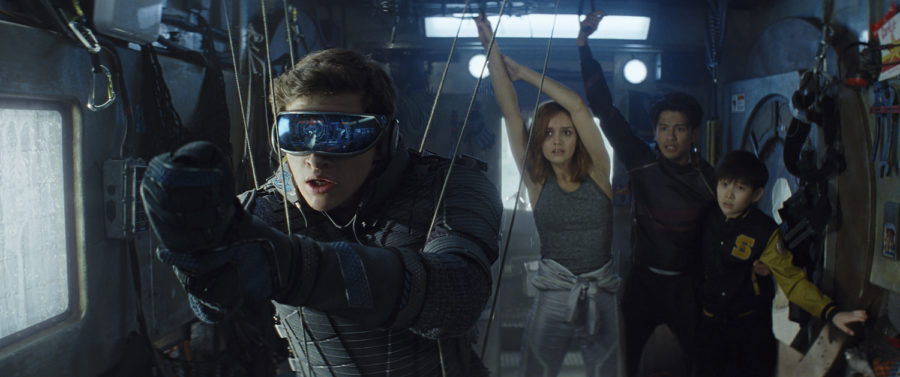Film deity and acclaimed director Steven Spielberg takes audiences on a two-hour-and-19-minute nostalgia fever dream with his latest film, “Ready Player One.”
Based on Ernest Cline’s popular novel of the same name, Spielberg’s adaptation of “Ready Player One” was shaping up to be the defining film of our generation — combining a visually immaculate world with an engaging commentary on technology. Instead, the film turned out to invest fully in the grand scale of its virtual reality and its hidden cultural references, or Easter eggs, at the expense of the story.
Set in a decaying futuristic society in 2045, the film introduces us to protagonist Wade Watts, played by Tye Sheridan — an average, nerdy teenager living with his poor aunt and uncle in “the stacks,” an arid tech junkyard located in Columbus, Ohio. Like everyone else, Wade is a captive of the OASIS, a virtual reality dreamscape where the possibilities are limitless.
The OASIS is the ultimate escape — a cloud nine of sorts — for everyone fed up with living through the harrowing monotony of reality. In the OASIS, you can be anyone you want, go anywhere you like and do anything your heart desires. However, not everyone is aimlessly playing the game for kicks.
Before his untimely death, the creator of the OASIS, James Halliday, played by Mark Rylance, tasks the inhabitants of the OASIS with finding an Easter egg hidden within the game.
The first person to find this egg will inherit Halliday’s company stock, amounting to half a trillion dollars, and will gain mastery over the OASIS itself.
Wade and his friends Art3mis, Aech, Daito and Sho — played by Olivia Cooke, Lena Waithe, Win Morisaki and Philip Zao, respectively — set out to find this egg. They hope to find it before the evil megacorporation Innovative Online Industries gets its hands on the egg — preventing the company from taking control over the OASIS and, eventually, the entire world.
“Ready Player One” is undoubtedly the most meta film to be released in decades. The OASIS is an all-encompassing amalgamation of countless pop culture references, ranging from ’80s horror movies, Spielberg blockbusters, contemporary and retro video games, comic books and anime.
These details can be insignificant and consequently uninteresting to someone who doesn’t notice or understand all of the Easter eggs scattered throughout the film. Aside from the viewers who are too busy scouring the screen for every Easter egg they can find, the other viewers’ only hope in relishing in this film relies in its characters and plot.
Though littered with intricate and playful world building, the plotline is rather bland, and most characters are one-dimensional. “Ready Player One” is an entertaining movie with more style than substance.
It reuses a tired narrative formula recycled in many older Hollywood films — such as “The Goonies” and “IT” and including even Spielberg’s films, such as “E.T. the Extra-Terrestrial” — in which a heroic youngster and his quirky friends go on a perilous adventure to try and stop some evil individual, corporation or force from disrupting the natural order.
It’s a formula that has worked in the past and is still considerably entertaining. But it provides a lackluster experience for viewers who expected to see Spielberg’s take on a novel exploring the evolution of virtual reality and its impact on a society that has been degraded from an oversaturated consumption of technology.
The characters themselves are unnaturally boisterous in their dystopian setting and feel stifled by stereotypical roles already overused in conventional film group dynamic. But despite the poor writing behind these characters, Tye Sheridan and Olivia Cooke’s performances stood out as embodiments of the inner dreamer within all of us, bringing heartfelt sentiment intermixed with childlike wonder to the screen.
“Ready Player One” is a must-watch film for anyone whose life is inundated with cinema, video games, television and music. It transports the viewer into an imaginary dreamscape where we can meet and become the iconic characters we’ve dreamt of and grown up with.
This film will leave you giddy and rapturous from all of the references it makes and demands die-hard fans go back again and again to catch every Easter egg hidden in the nooks and crannies of the film.
As much as “Ready Player One” is a love letter to video game culture, it equally critiques its flaws — such as the lack of outside social interaction and the concealment of one’s self from society. Spielberg presents an interesting dichotomy between the two sides of virtual reality gaming, giving the audience some challenging food for thought long after the joyride is over.


